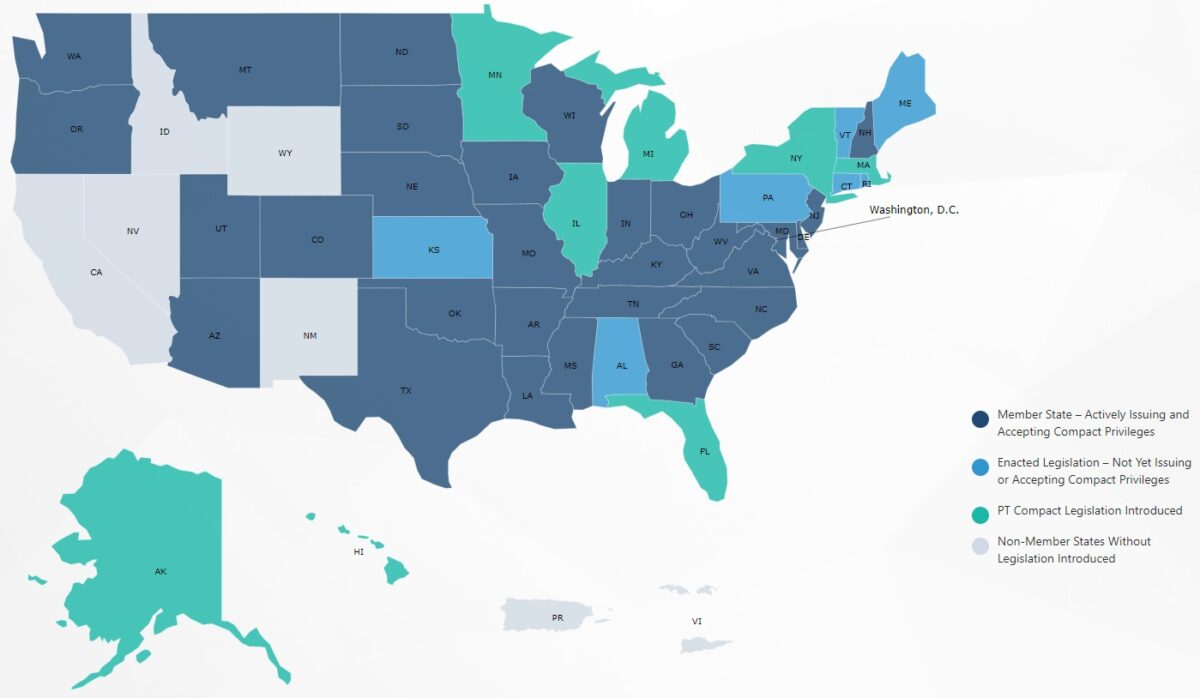In recent years, many states have coordinated so that licensed skilled professionals from one state have reciprocal privileges to work in another. For healthcare professionals, such coordination can mean it’s easier to work in high-demand areas, take temporary work assignments and meet the needs of the general public. Much like the Nurse Licensure Compact and the planned Occupational Therapy Licensure Compact, the Physical Therapy Licensure Compact (PT Compact) is a coordinated interstate effort that allows physical therapists (PTs) and physical therapist assistants (PTA) to work outside their home states without obtaining another license.
Related: Career Options: Physical Therapist vs. Occupational Therapist
The PT Compact doesn’t offer a multistate license per se but rather a way to get privileges to practice outside your state of permanent residence while working under your home state license. Your home state must participate in the PT Compact and you must maintain your license according to your home state’s rules to access privileges to work in any other participating state. We provide lists below of states that do and don’t participate in the Compact, including those that may join in the near future.

Source: PT Compact Commission / Federation of State Boards of Physical Therapy
States That Participate in the PT Compact
The following 30 states have fully enacted the Compact. PT and PTA licenses issued by one state are valid in any of these states once you apply for that state’s privileges. See below for the dates the state enacted the Compact and started issuing Compact privileges, whether the state requires passing a state jurisprudence exam and the fee the state charges for the Compact privilege, if applicable. The individual state fee is in addition to the standard $45 fee the PT Compact Commission charges all applicants and some states require applicants to pass its jurisprudence exam at each renewal.
Arizona
- Enacted: 5/17/16
- Active Since: 4/15/19
- Jurisprudence Exam: Yes (initial & renewal)
- Fee: $0
Arkansas
- Enacted: 3/5/19
- Active Since: 2/28/20
- Jurisprudence Exam: Yes (initial & renewal)
- Fee: $3
Colorado
- Enacted: 5/10/17
- Active Since: 5/1/19
- Jurisprudence Exam: No
- Fee: $50
Delaware
- Enacted: 7/30/19
- Active Since: 9/20/21
- Jurisprudence Exam: No
- Fee: $55
Georgia
- Enacted: 4/23/19
- Active Since: 3/1/21
- Jurisprudence Exam: Yes (initial & renewal)
- Fee: $65
Indiana
- Enacted: 4/29/21
- Active Since: 4/20/23
- Jurisprudence Exam: No
- Fee: $104
Iowa
- Enacted: 4/4/18
- Active Since: 1/2/19
- Jurisprudence Exam: No
- Fee: $60
Kentucky
- Enacted: 3/21/17
- Active Since: 3/21/19
- Jurisprudence Exam: Yes (initial & renewal)
- Fee: $103
Louisiana
- Enacted: 5/23/18
- Active Since: 7/22/19
- Jurisprudence Exam: Yes (initial & renewal)
- Fee: $95
Maryland
- Enacted: 4/30/19
- Active Since: 7/1/21
- Jurisprudence Exam: Yes (initial only)
- Fee: $125
Mississippi
- Enacted: 3/13/17
- Active Since: 7/13/2018
- Jurisprudence Exam: Yes (initial only)
- Fee: $150
Missouri
- Enacted: 8/28/16
- Active Since: 7/9/18
- Jurisprudence Exam: Yes (initial only)
- Fee: $20
Montana
- Enacted: 2/20/17
- Active Since: 7/1/21
- Jurisprudence Exam: Yes (initial only)
- Fee: $50
Nebraska
- Enacted: 4/19/18
- Active Since: 4/15/19
- Jurisprudence Exam: No
- Fee: $35
New Hampshire
- Enacted: 7/1/17
- Active Since: 1/2/19
- Jurisprudence Exam: Yes (initial & renewal)
- Fee: $65
New Jersey
- Enacted: 1/15/18
- Active Since: 6/1/23
- Jurisprudence Exam: Yes (initial & renewal)
- Fee: $40
North Carolina
- Enacted: 6/8/17
- Active Since: 7/1/19
- Jurisprudence Exam: Yes (initial & renewal)
- Fee: $72
North Dakota
- Enacted: 3/13/17
- Active Since: 7/9/18
- Jurisprudence Exam: Yes (initial only)
- Fee: $40
Ohio
- Enacted: 3/31/21
- Active Since: 10/1/21
- Jurisprudence Exam: Yes (initial & renewal)
- Fee: $50
Oklahoma
- Enacted: 5/8/18
- Active Since: 1/2/20
- Jurisprudence Exam: No
- Fee: $55
Oregon
- Enacted: 3/3/16
- Active Since: 7/30/18
- Jurisprudence Exam: Yes (initial only and within 6 months of Compact purchase)
- Fee: $50
South Carolina
- Enacted: 5/18/18
- Active Since: 2/1/23
- Jurisprudence Exam: No
- Fee: $0
South Dakota
- Enacted: 3/26/20
- Active Since: 11/14/22
- Jurisprudence Exam: No
- Fee: $62
Tennessee
- Enacted: 4/14/16
- Active Since: 7/9/18
- Jurisprudence Exam: Yes (initial & renewal)
- Fee: $25
Texas
- Enacted: 5/22/17
- Active Since: 1/2/2019
- Jurisprudence Exam: Yes (initial & renewal)
- Fee: $50
Utah
- Enacted: 3/22/17
- Active Since: 10/1/2018
- Jurisprudence Exam: No
- Fee: $47
Virginia
- Enacted: 3/8/19
- Active Since: 1/2/2020
- Jurisprudence Exam: No
- Fee: $50
Washington
- Enacted: 5/25/17
- Active Since: 9/23/2019
- Jurisprudence Exam: Yes (initial and renewal)
- Fee: $47
West Virginia
- Enacted: 6/7/18
- Active Since: 3/10/20
- Jurisprudence Exam: No
- Fee: $50
Wisconsin
- Enacted: 2/5/20
- Active Since: 10/3/22
- Jurisprudence Exam: Yes (initial only)
- Fee: $56
Washington, D.C
- Enacted: 3/16/21
- Active Since: 11/6/2023
- Jurisprudence Exam: Yes (initial only)
- Fee: $264
States Not Issuing PT Compact Licenses
Several states don’t currently issue privileges in the PT Compact for various reasons. Residents of states in the following three groups must be issued a license by their home state. To work in another state, whether that state is in the compact or not, the PT or PTA must apply for another license in that state and meet that state’s requirements.
Legislation Enacted – Not Yet Issuing Compact Privileges
Seven states have passed legislation to join the Physical Therapy Licensure Compact but haven’t begun issuing compact privileges yet for various reasons. In some cases, the state passed incorrectly worded legislation that needs to be amended. In other cases, the necessary state agencies have yet to set up a system for processing compact privileges or there are other regulatory delays. Years can pass between the passage of legislation and the necessary implementation.
The following list provides the date each state passed legislation and the implementation date if one has been set:
Alabama
- Enacted: 3/18/21
- Implementation Date: Not Set
Connecticut
- Enacted: 7/1/23
- Implementation Date: Not Set
Kansas
- Enacted: 5/17/23
- Implementation Date: Not Set
Maine
- Enacted: 6/26/23
- Implementation Date: 1/1/26
Pennsylvania
- Enacted: 11/25/20
- Implementation Date: Not Set
Rhode Island
- Enacted: 6/25/24
- Implementation Date: Not Set
Vermont
- Enacted: 6/1/23
- Implementation Date: Not Set
States Where PT Compact Legislation Has Been Introduced
Eight states have introduced legislation in one or both legislative chambers to begin the process of joining the PT Compact, but this legislation hasn’t passed yet. We list the bills introduced and the introduction dates below. However, the introduction of a bill is no guarantee that the legislature will ultimately pass it.
Alaska
- Introduced Senate Bill (SB) 74 on 2/17/23 and House Bill (HB) 137 on 3/27/23 / Bills passed May 15, 2024, and sent to the Governor for signature
Florida
- Introduced SB 7016 on 12/4/23 and HB 1549 on 1/8/24
Hawaii
- Introduced SB 668 on 1/20/23
Illinois
- Introduced HB 1437 on 1/25/23
Massachusetts
- Introduced HB 2233 on 2/16/23
Michigan
- Introduced HB 4504 & 4505 on 5/4/23
Minnesota
- Introduced HB 5356 on 1/13/23
New York
- Introduced Assembly Bill 7948 on 8/4/23 and SB 6872 on 5/12/23
States with No Action on the PT Compact
The following five states weren’t actively taking steps to join the Physical Therapy Licensure Compact as of this writing:
- California
- Idaho
- Nevada
- New Mexico
- Wyoming
Understanding How the Physical Therapy Licensure Compact Works

Licensure in your home state is the primary requirement to gain privileges to provide physical therapy in another state. Under the Compact’s rules, your home state is where you currently hold a driver’s license. If you change residence and, therefore, your driver’s license to another state, you must become licensed in that state and notify the PT Compact Commission within 30 days using their online dashboard. If your new state of residence doesn’t participate in the Compact, you will lose the practice privileges you had in any other state through the Compact.
Related: What’s the Difference Between the eNLC and the APRN Licensure Compacts
Because a compact privilege isn’t a multistate license, you must obtain a new privilege for each participating state you want to practice in. That includes paying the relevant fees and taking any required exam for each state. PTs and PTAs can’t ever use Compact privileges to practice or work in their home states. They must maintain a full license in their home states.
Practical Examples of the Physical Therapy Licensure Compact
Consider this scenario: You live in and are licensed in Ohio, a Compact state, but want to work temporarily as a travel PT or PTA in Washington, another compact state. You can apply for Compact privileges in Washington by paying the state’s $47 fee and the Commision’s $45 fee and passing Washington’s state jurisprudence exam.
After your stint in Washington, say you want to take a temporary job in Virginia, another Compact state. The state has no jurisprudence exam requirement, so you pay Virginia’s $50 fee and the Commission’s $45 fee to begin practicing there. Now you can work in Virginia, while maintaining privileges to work in Washington and your home state, Ohio.
However, say that you want to do a travel stint in California. Since the state isn’t in the Compact, you must go through the entire application process for a California PT or PTA license to work there.
Meanwhile, let’s say you move out of Ohio permanently to a non-participating state, such as Nevada. Now, you must obtain a Nevada PT or PTA license to keep working. Simultaneously, you lose your privileges to work in Virginia, Washington or any other Compact states where you don’t hold a full license within the state.
The bottom line for physical therapists and physical therapist assistants is that if your home state participates in the Physical Therapy Licensure Compact, you can easily gain privileges to work in another Compact state. Vivian Health lists job openings for allied health professionals, such as PTs and PTAs, in all 50 states.
Browse jobs in any state and put the PT Compact to use for your travel work ambitions today.
The source of all information on individual state privileges, rules and fees, as well as the status of non-participating states, comes from the PT Compact website.





 - Small-593x370.png)



